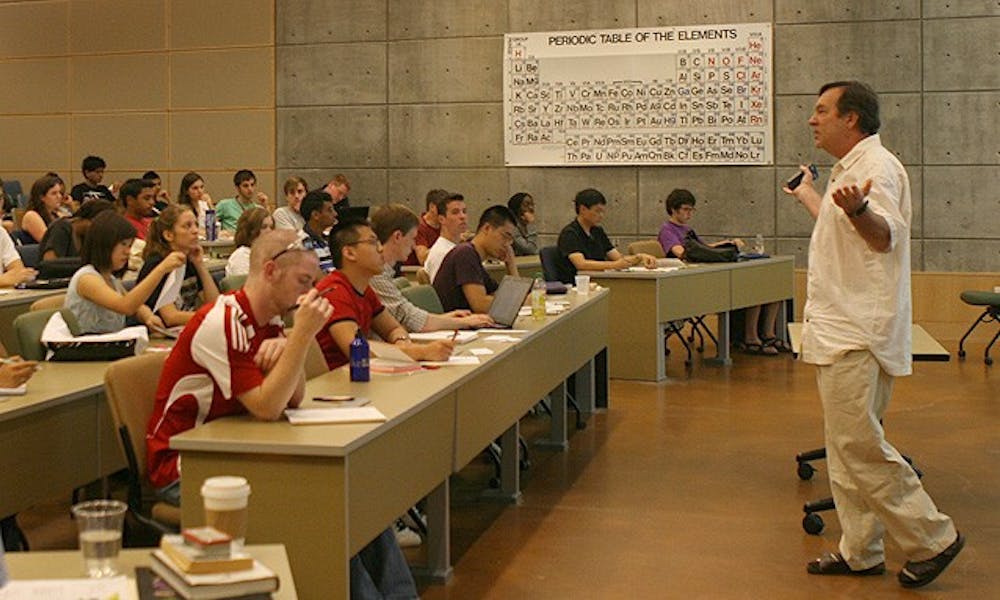Midway through the semester, biology professors in two new introductory courses have received lackluster feedback from the first students enrolled.
Last Spring, the biology department announced a drastic change to the curriculum for Fall 2010. The three introductory courses BIO 25L, 116 and 118 were replaced by two gateway courses—101L: “Gateway to Biology: Molecular Biology” and 102L: “Gateway to Biology: Evolution and Genetics.”
In the last several weeks, students in both classes completed course surveys rating lectures, labs and professor teaching styles.
102L currently has 117 students enrolled, while 101L has more than twice that amount, with 312 students, wrote Julie Reynolds, assistant professor of the practice and associate director of undergraduate studies for biology, in an e-mail. In addition, 52 percent of students in 101L responded to the survey, while only 45 percent responded in 102L, she added. Although surveys were completed by students in both courses, feedback has only been analyzed by instructors from 101L.
“Getting feedback from the students is very helpful, but we still have to execute, and now it’s up to us,” said Dan Kiehart, chair of the biology department and professor of 101L.
Kiehart said the most positive feedback concerned adding labs to both gateway courses. In the previous curriculum, only one of the introductory classes, 25L, required a lab.
“Overall, I think students feel like implementing labs was a good idea,” he said. “[The lab] connects what they’re learning in lecture to experimental technique.”
John Willis, professor of 102L, echoed Kiehart’s sentiments, saying the labs “really give [the students] hands-on experience to try to learn the material a different way.”
But for Bio 101L, negative feedback seemed to outweigh the positive. Several students expressed concern regarding the nature of the new course.
“It’s a new course, so it’s going to have it’s glitches, but it’s irritating, because the students kind of feel like guinea pigs,” said Stephanie Rotolo, a sophomore.
Other students, including sophomore Rachel Vorwaller, agreed with Rotolo, also noting the heavy workload.
“I think there was a lot of negative feedback, because the course is very time consuming,” Vorwaller said, adding that students are particularly frustrated with the reading quizzes given every Friday.
Kiehart acknowledged he was surprised by the many negative responses to the weekly quizzes, which are each worth only 1 percent of a student’s overall grade. He explained that they were instituted in an attempt to reduce stress but said that unfortunately, they “have had absolutely the opposite effect on the students.”
Kiehart also noted that he was especially disappointed in the number of students who reported that they were enthusiastic about biology prior to the course, but that the course’s workload was a “turnoff.”
Indeed, Rotolo said the course did not encourage her to pursue the biology major.
“The course didn’t necessarily discourage me from pursuing the major, but it didn’t encourage me either,” she said. “I am now considering the minor.”
The instructors for 101L are using student feedback to re-evaluate elements of the course, Kiehart said, adding that a change in the way exams are graded that does not penalize students for incorrect answers has already been implemented.
Looking long-term, Kiehart also hinted at possible changes to the textbook. He said the instructors plan to go through the textbook and either switch to a new text or devise a template so that students can better understand which materials to study.
Although much of the feedback for 101L may have been negative, Kiehart remains optimistic about the future of the course.
“One of the firm convictions that I have is that if we can do this right, it’ll be a great course, and I think we can do this right,” he said.
Get The Chronicle straight to your inbox
Signup for our weekly newsletter. Cancel at any time.

